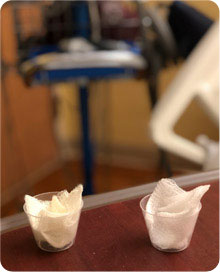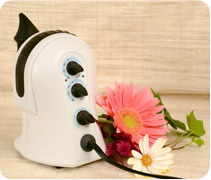Newsletters » Essential Oils in the Hospital

Using Essential Oils in the Hospital

This past January, my husband and I drove to Iowa City to be with a good friend and his wife while our friend had major surgery. We were very impressed with the University of Iowa Hospital and staff. It was the cleanest hospital facility we'd ever encountered and the staff went out of their way to be respectful and to offer help when needed. As a bonus for us southerners, Iowa City had quite a bit of snowfall while we were there, giving us beautiful scenes we just don't experience where we live in Central Texas.
 Given the nature of the surgery and the predicted long recovery time, we all felt the weight and concern that we wanted to protect our friend from acquiring a hospital-acquired super-bug infection. Besides equipping ourselves with our Citrus Quench hand cleanser and a homemade version with the Mercy blend, our hope was to be able to diffuse essential oil in his room with permission from the hospital staff. (My Mercy hand cleaner recipe is found on the Mercy detail page in the Application Suggestion section under Topical Use.)
Given the nature of the surgery and the predicted long recovery time, we all felt the weight and concern that we wanted to protect our friend from acquiring a hospital-acquired super-bug infection. Besides equipping ourselves with our Citrus Quench hand cleanser and a homemade version with the Mercy blend, our hope was to be able to diffuse essential oil in his room with permission from the hospital staff. (My Mercy hand cleaner recipe is found on the Mercy detail page in the Application Suggestion section under Topical Use.)
When we asked the attending nurse about diffusing essential oils, she lit up and greatly encouraged us to do so. She even offered that they have essential oils on hand to share with us! She proceeded to mention that there have been numerous studies done that prove that using essential oils in the rooms improves sleep, eases pain and reduces stress/anxiety. She was very excited and over-the-top in her efforts to support us. She promptly returned with gauze pads in medicine cups soaked with Lavender and Eucalyptus!
Common Essential Oils Used in Hospital Settings
These are common singles provided by health care facilities for inhalation ~ All are immune supportive
Eucalyptus radiata or globulus - headache, pain, respiratory
Ginger Root - nausea, vomiting, pain, inflammation
Lavender - anxiety, headache, pain, nausea, vomiting
Mandarin - anxiety, appetite, digestion, gas, stomach cramps, nausea
Sweet Marjoram - anxiety, pain
Sweet Orange - anxiety, appetite, digestion, gas, stomach cramps
Peppermint - headache, pain, digestion, nausea, vomiting, respiratory
Roman Chamomile - anxiety, digestion, headaches
We were able to set up our diffuser and alternated diffusing Mercy and Warrior. I'd also made up a few personal inhalers for all of us. After the surgery, our friend liked the Breathe Happy one the best.
Methods of Use in the Hospital
Electric Diffusion
Medicine cup with gauze or cotton ball
Personal Inhaler
Topical Application with appropriate dilution
While we would all love to avoid the need for a hospital stay, inevitably we or a loved one will find ourselves needing their services. I hope our story will be an encouragement to you.
There are numerous studies that demonstrate the efficacy of using essential oils in health care settings. I've gathered some and posted them below. What a blessing it was to have a nurse who was familiar with this research and eager to help us use essential oils to help our friend!
Research
"Unfortunately, HAIs affect 5 to 10 percent of hospitalized patients in the U.S. per year. Approximately 1.7 million HAIs occur in U.S. hospitals each year, resulting in 99,000 deaths and an estimated $20 billion in healthcare costs. The CDC estimates two million people in the United States are infected annually by hospital-acquired infections, resulting in 20,000 deaths. The most common infections are those of the urinary tract, the surgical site and from various pneumonias at a cost of $20,000 to $25,000 per patient. - How Hospitals Can Kill You - Part 1 by Advanced Medical Integration
https://www.amidoctors.com/how-hospitals-can-kill-you-part-1/
The Effectiveness of Nurse-delivered Aromatherapy in an Acute Care Setting
"Essential oils generally resulted in significant clinical improvements based on their intended use, although each oil also showed ancillary benefits for other symptoms."
https://www.ncbi.nlm.nih.gov/pubmed/27062964
Study of Aromatherapy for the Treatment of Postoperative Nausea and Vomiting - PubMed
Lavender and Ginger essential oils
https://www.ncbi.nlm.nih.gov/pubmed/30670276
The Efficacy of Lavender Aromatherapy in Reducing Preoperative Anxiety in Ambulatory Surgery Patients Undergoing Procedures in General Otolaryngology - Laryngoscope Investigative Otolaryngology
"A majority of patients reported that they felt calmer while receiving aromatherapy and found the Lavender scent pleasant. Given the simplicity, low cost and safe profile of Lavender aromatherapy, the authors promote its use. . . Lavender aromatherapy reduced preoperative anxiety in ambulatory surgery patients undergoing procedures in general otolaryngology."
https://www.ncbi.nlm.nih.gov/pmc/articles/PMC5743169/pdf/LIO2-2-437.pdf
Comparison of the Effect of Aromatherapy with Jasminum officinale and Salvia officinale on Pain Severity and Labor Outcome in Nulliparous Women - Iranian Journal of Nursing and Midwifery Research
"The results of the present study indicated that aromatherapy with salvia had beneficial effects on pain relief, shortened the labor stages, and had no negative impact on the baby's APGAR score." https://www.ncbi.nlm.nih.gov/pmc/articles/PMC4280734/
Effects of Citrus Aurantium (Bitter Orange) on the Severity of First-Stage Labor Pain - PubMed
"The results of the study showed that aromatherapy using C. aurantium reduces labor pain. The method is recommended for implementation as an approach to reduce labor pain based on its low cost, ease of application, and non-invasiveness."
https://www.ncbi.nlm.nih.gov/pmc/articles/PMC4177623/pdf/ijpr-13-1011.pdf
Effects of Aromatherapy on Sleep Quality and Anxiety of Patients - PubMed
"Lavender essential oil increased quality of sleep and reduced level of anxiety in patients with coronary artery disease."
https://www.ncbi.nlm.nih.gov/pubmed/26211735
Effect of Inhalation Aromatherapy with Lavender Essence on Pain Associated with Intravenous Catheter Insertion in Preschool Children - PubMed
Aromatherapy with Lavender essence helped to reduce pain severity of intravenous catheter insertion in children.
https://www.ncbi.nlm.nih.gov/pubmed/28779942
Nurse's Study on Essential Oils Helps Cardiac Rehab Patients Improve Sleep Quality - Texas Health Resources
"The patients placed cotton balls infused with either an interventional oil mixture of Lavandula x intermieda (Lavendin Super), Citrus bergamia (Bergamot), and Cananga odorata (Ylang ylang) or an aromatic placebo mixture at their bedside for five nights. Study results indicated patients who used the interventional oils had overall better sleep quality than those who received the placebo."
https://www.texashealth.org/news/nurses-study-on-essential-oils-helps-cardiac-rehab-patients-improve-sleep-quality
The Battle Against Multi-resistant Strains: Renaissance of Antimicrobial Essential Oils as a Promising Force to Fight Hospital-Acquired Infections - PubMed
"Several common and hospital-acquired bacterial and yeast isolates (6 Staphylococcus strains including MRSA, 4 Streptococcus strains and 3 Candida strains including Candida krusei) were tested for their susceptibility for Eucalyptus, Tea tree, Thyme white, Lavender, Lemon, Lemongrass, Cinnamon, Grapefruit, Clove Bud, Sandalwood, Peppermint, Kunzea and Sage oil with the agar diffusion test. Olive oil, Paraffin oil, Ethanol (70%), Povidone iodine, Chlorhexidine and hydrogen peroxide (H(2)O(2)) served as controls. Large prevailing effective zones of inhibition were observed for Thyme white, Lemon, Lemongrass and Cinnamon oil. The other oils also showed considerable efficacy. Remarkably, almost all tested oils demonstrated efficacy against hospital-acquired isolates and reference strains, whereas Olive and Paraffin oil from the control group produced no inhibition. As proven in vitro, essential oils represent a cheap and effective antiseptic topical treatment option even for antibiotic-resistant strains as MRSA and antimycotic-resistant Candida species." https://www.ncbi.nlm.nih.gov/pubmed/19473851



9 Newsletter Comments
This is wonderful information...and comprehensive enough to convince naysayers. It's important for everyone to know that 'the science' supports essential oils as supportive for the immune system and as an inexpensive upgrade to antibiotics. Could be your best 'post' yet!! Thank you so much. I'm sharing this information with everyone who walks. ; )
Annette
This is an encouraging and enlightening story. Thank you for sharing!
Linda
Excellent article Linda. Thank you!
Sabina
How encouraging that the hospital staff were supportive of using the oils! So glad to hear this.
Kim
This is awesome! Thank you for sharing!
Carrie
That is awesome!!
Leslie
WOW, I made a copy of this to give to my Orthopedic Dr. who just did my hip replacement. I had asked the hospital if I could diffuse my EO's in my room on my overnight stay to help prevent infection & they said no, but my Dr. was open to the natural remedies I used before & after surgery.
Kalinda
Thanks especially I still work in the hospital as a volunteer after retiring!
William
Thank you for this info, Linda! My dad's cousin was here for a visit a few years ago around the time that we discovered EOs. She is a labor and delivery nurse for a large hospital in the Minneapolis area and said they use them as well. It's great to see natural and mainstream medicine work together.
Heather